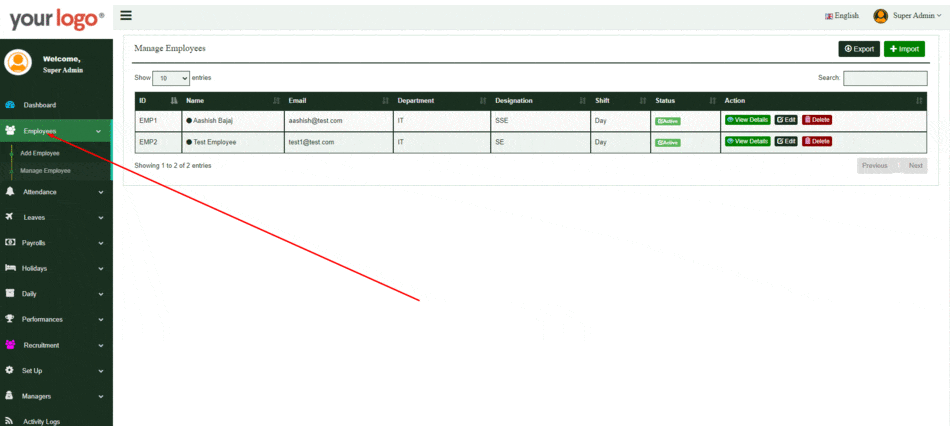Employee Legal Rights In India

Employees engage in certain activities that are secured by laws and social sanctions based on employment rights. The relationship between employees and management is governed by certain federal and state laws. Unlawful treatment by employees is also protected through the courts. There are a number of employee rights, all of which are protected by different laws and regulations.
The human resource management area of an organization is governed by many laws and regulations that help to set, maintain and protect the rights of employees. There are discrimination laws that allow employees to work without being judged on non-job related factors such as gender, religion, race, etc. Employees can demand a certain level of basic compensation from management. in light of minimum wage laws.
In other words , employees’ rights are defined as the opportunity to receive fair treatment from employers.
These are the rights and protections granted to employees by labor law. Rights can be different in different countries, but there are a few basic rights that are followed by each organization. These include :
- Right to Over time pay.
- Right to Minimum Wage.
- Right to be safe and healthy workplace.
Many workers’ rights are also protected by the Universal Declaration of Human Rights, which guarantees all workers the right to freedom of association, the right to collective bargaining, and the right to strike.
WHAT ARE THE LEGAL ASPECTS OF EMPLOYMENT RIGHTS?
THE IMPORTANCE OF EMPLOYMENT RIGHTS

Employees are the backbone of any company. Employees are considered to start or dissolve businesses. According to the basic textbook definition, an employee is someone who has accepted work for payment based on an employment contract.
On the other hand, employees play a much more important role in the organization by developing a strong and deep relationship with their employers. Employees are required to create, manage, organize, promote, sell, transport, maintain, and repair when employers start a business (or develop a branch of an existing business). As a result, employees are the ones who run the business.
The wisest career move a person will ever make is to educate themselves before, during and after their work experience. This will benefit both management and employees as it will help employees understand their rights and give them a more accurate picture of their options. When management informs employees of these rights, they must create an environment in which these rights are respected. As a result, both parties recognize each other’s rights and obligations, which has a significant impact on organizational productivity.
Learning about employee rights in India is important as it ensures that there is no discrimination. In India, there are a number of provisions in employment laws that protect the interests of employees. The Constitution of India is the foundation of individual rights and freedoms and also the basic framework within which all Indian legislation, including labor and employment regulations, must operate. During work, all employees have certain rights and obligations; various Indian employment laws state that the rights of employees are equivalent to those of the employer; these rights protect employees from unfair discrimination based on sex, age, ethnicity, caste or religion. Employees have the right to privacy, fair wages, paid time off and other benefits. Several provisions have been included in Indian employment laws to protect the interests of employees.
In the workplace, all workers have basic rights such as the right to food, the right to safety, the right to be paid for the work they do, the right to join a union, and the right to assemble – including the right to privacy, fair compensation and freedom from discrimination, and the right to access to justice.
In order to avoid a violation of these rights and obligations, it is necessary to understand what is involved. Employers and employees have mutual obligations to each other that are set out in their employment contracts.
Their importance cannot be overstated – labor (or employment) laws are the foundation of our economic system! Over the years they have grown to reflect the values we hold as a company and our ideal of equality for all people. When a business breaks the law, there can be devastating consequences through government fines and legal action, so it is critical that businesses incorporate best practices to ensure the well-being of the company and its employees.
A simple but effective way to achieve a best practice model is to create four documents: Offer Letter, Employment Agreement, Employee Handbook and, if necessary, Termination Letter. Each of these documents, when followed in that order, provides the best protection for the employer/employee relationship.
Employee offer letter
The first step in the new employer/employee arrangement is to start the Offer Letter. While there is no legal requirement to provide an offer letter, it has important legal significance and is a starting point for negotiations. Job duties, relevant company information, terms and conditions (background checks, drug testing, etc.), salary and benefits are contained in this document and are often the starting point for negotiations.
Employment contract
An offer letter can be so detailed that it can sometimes be all you need to provide the employee, often for a lower-level position. But for higher positions, a signed employment contract is necessary. Employment contracts are an often overlooked step, but not including this powerful document in your company’s hiring process can be a terrible mistake.
An employment contract is a legally binding document that is designed to provide certainty and protection to both parties. This document typically covers wages, benefits, termination procedures, confidentiality, intellectual property protection, and client non-solicitation. It’s a great way to start a positive working relationship because of the structure, security, and stability it provides.


Employee handbook
The best protection for an employer is the use of an Employee Handbook. If it’s written well, it’s an incredibly valuable tool for educating employees about the right practices, values, and expectations the company has. It also informs them about their rights and obligations as employees. An employee handbook should be considered a living document – one that is regularly reviewed, revised, and grows as the business evolves. The employee handbook serves as the first place HR turns to when it’s time to fire an employee for reasons such as competing with your company, among many other actions employees can take against your company.
Termination letter
The final document, the Letter of Termination of Employment, contains several important pieces of information that employers must be careful about wording correctly. The key elements are the date of termination and the reason for termination. It may also include confidentiality reminders, a request to return equipment, compensation, and an outline of what will happen to their benefits. Ending an employment relationship can be a difficult and sensitive event, and a termination letter provides a clear path to resolving any remaining issues.
TYPES OF EMPLOYEE RIGHTS
Employment laws in India contain several provisions to protect the interests of the employee. Employees have the right to privacy, fair pay, paid time off and financial benefits. The employee’s legal rights are explained in detail as follows.

Gratuity and provident fund
The Payment of Gratuity Act, 1972 explains gratuity as a retirement benefit paid to an employee at the time of retirement, termination, resignation, or death of the employee. It is paid to employees who have completed at least five years of continuous service. If an employer refuses to pay an employee a tip, they can contact employment lawyers and take legal action.
On the other hand, a pension fund is a pension and savings program. The Employees Provident Fund Organization of India (EPFO) manages provident funds for all employees and ensures that they are paid in India. Under the Employees’ Provident Funds & Miscellaneous Provisions Act, 1952, employees have the option to keep a portion of their salary invested in the EPF, which the employer transfers directly to their PF accounts.
Maternity Allowance
An employee is entitled to maternity/pregnancy leave for a period of 26 weeks, which can be taken during pregnancy and/or after childbirth. The Maternity Benefit Act, 2017 protects the interests of employers of pregnant and lactating women in India. Maternity leave can also be taken in the event of pregnancy complications, premature birth, abortion, or medical termination of pregnancy. Some private companies in India also provide paternity leave to their male employers, allowing them to take care of their new-born child.
Protection from sexual harassment
The employer has a duty to ensure that all employers, especially female employees, are protected from any form of harassment. Any incident of sexual harassment involving an employee must be dealt with promptly and promptly. The employer must enact a company policy prohibiting sexual harassment in the workplace and establish a remedial committee to deal with every case of sexual harassment in the office. A woman can make a complaint of sexual harassment in the workplace under the Sexual Harassment of Women in the Workplace (Prevention, Prohibition, and Remediation) Act 2013. An employee can also bring a sexual harassment claim in an employment tribunal by hiring an employment lawyer.
Reasonable working hours and overtime
All employees have the right to work in a safe workplace with basic equipment and hygiene.
The Factories Act provides for and the Shops and Establishments (state) Acts protect the rights of workers and Sunday workers.
Under the latest laws, an adult worker must work more than 9 hours a day or 48 hours a week, and overtime will be double the regular wage. A worker can work from 6am to 7pm This can be released by 9.30pm subject to express permission and payment of overtime and safe transport. In addition to this weekly holiday, a half-hour break and no more than 12 hours of work on any day are mandated. The working hours of child workers are limited to 4.5 hours per day.
Rights to keep copies of documents you sign
Employees have the right to keep documents they have signed. It gives both parties a sense of security, both fully understand their obligations and undertake to comply with the set conditions.
Equal pay for equal work
The constitutional right to equal pay for equal work also means that every employer is required to pay the same wages to men, women or even temporary employees performing the same tasks or duties.
Unfortunately, despite the repeated focus on women’s empowerment and gender equality in public discourse, there is still a significant gap between men and women in pay grades.

The right to be paid the minimum wage for organized and planned work
According to the Minimum Wage Act, both skilled and unskilled workers should be paid a basic wage and if they are paid less than this, it will be categorized as forced labor and the employee has every right to sue the employer for forcing them to work. slavery. Withholding wages is a very cruel thing and it is one of the basic employment rights that every employee, skilled and unskilled, must be aware of.
On Time Wage
An employee is entitled to on time wages at the end of each month. The employer is required to pay the salary amount to the employee after making necessary deductions like TDS, Provident Fund etc. The employee can hire a labor lawyer to take proper legal action against the employer for non-payment of salary.
Notice period
If the employer wants to give notice to the employee, the notice must be delivered to the employee so that he is ready for the notice. An employer cannot terminate an employee without a notice period. In the event that the employer dismisses the employee without a serious reason and without notice, the employee can turn to a labor lawyer and file a complaint against the employer for unjustified termination of employment.
Leaves
The leave policy must be designed according to state legislation and rules. It is mandatory to provide leave to employees on the country’s three public holidays, which are Republic Day (January 26), Independence Day (August 15) and Gandhi Jayanti (October 2).
In addition to public leave, employees are entitled to additional leave, which includes:
- Occasional leave
These sheets are kept for unforeseen circumstances/events when an employee may attend to some urgent matter. The company usually provides up to 3 days of informal leave per month. - Privilege leaves
These leaves are carried over from previous years and are enjoyed by the employee in the current or future years. These can also be paid in lieu of sick leave if the employee has used up all their sick leave. If the employee has leave with the right to the balance when leaving the job, these leaves can be reimbursed. - Replacement leaves
The employee can take these holidays if he works on official days off. - Leave without pay
If there is no leave left in the employee’s balance, he can take leave, but the pay for that day will be deducted from his monthly salary. Paid leave may be granted to an employee at the discretion of the governing body. - Maternity leave
An employee is entitled to maternity/pregnancy leave of 26 weeks (for women with less than two surviving children). This leave can be used during pregnancy and/or after childbirth. Maternity leave can also be taken in case of complications during pregnancy, premature birth, abortion or medical termination of pregnancy.
Child Labor Regulations (CLR)
One of the most important regulations, the government is more proactive than ever to ensure a complete ban on child labor in India. However, the latest amendment in 2016 relaxed the guidelines a bit. The employment of children under the age of 14 in all occupations and processes is prohibited. However, there are now some exceptions to the law. If you work in the entertainment industry or in a health-friendly industry, children over the age of 14 can work after school, provided they are provided with all the amenities required by law.
Payment of Wages Act, 1936
As HR, it is your responsibility to ensure that wages due are credited to workers on a monthly basis without unnecessary deductions. This act is a guide to ensure that such irregularities can be avoided. This Act provides standards for assessing employee compensation and ensures that salaries are governed by industry standards. This is an act that aims to give you and your employees equal bargaining power.
Right to complain or protest against work
Every employee has the right to protest or complain about working conditions, which is provided by the Factories Act, 1948. The law says that every worker has the right to protest and raise objections to improper working conditions.
Fundamental rights – Health and safety
It is essential to learn about the relevant acts that ensure your basic rights; learn about the rights of employees. Under the Factories Act 1948, all employees are entitled to basic rights to health and safety at work as part of a healthy and viable working environment, regardless of the type of work involved. The employer is responsible for providing basic equipment to its employees. In workplaces such as construction sites or mining sites, appropriate safety precautions must be taken; hazardous equipment must be used under professional supervision, and children under 14 must not be allowed to work.
Failure to provide a safe and healthy environment due to an employee’s injury would mean the employer’s obligation to pay compensation under the Workers’ Compensation Act of 1923. The basic equipment of employers is to provide their employees with a hygienic working environment, clean drinking water, proper waste disposal, sanitary toilets, a room for ventilation, sufficient lighting etc.
In addition to these rights, an employee also has the right to a safe workplace with basic facilities, and the right to any promised incentive, etc.
WHAT ACTION CAN BE TAKEN AGAINST AN EMPLOYER WHO DOES NOT PAY ITS EMPLOYEES ON TIME?
The Payment of Wages Act of 1936 mandates that an employee’s wages be paid promptly. Employees can file a legal complaint or contact the Labor Commissioner if payment is not made. The Payment of Bonus Act of 1965 mandates that any firm or corporation that is five years old and employs 20 or more people in any accounting year must pay a bonus to its employees.
CONCLUSION
Employment laws in India protect the rights of both employers and employees working in the public, private and unorganized sectors. Employers and employees have certain rights and obligations towards each other during employment. Any violation of these rights or failure to comply with any obligation may result in a legal dispute between them. The basis of any employment relationship or employer-employee relationship is an agreement on work activities. Apart from statutory rights, employment contract also provides employment rights in India, employer rights in India, and employee rights in India.
An employer can take legal action with the help of employment lawyers against an employee who violates any of these rights. An employer can file a lawsuit in a civil court or a labor court against an employee who does not fulfill his duties and acts contrary to the employer’s interests.







